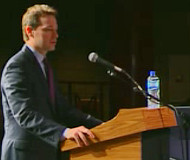Article from: www.thenewspaper.com/news/44/4414.asp
5/20/2014
Minnesota Legislature And Supreme Court Take On Car Seizures
Minnesota enacts law cracking down on police car seizure as state Supreme Court hears oral argument in confiscation case.
 Beginning in August, a new Minnesota law will take effect prohibiting the seizure of property from people who have never been convicted of any crime. SF 874 passed the state House and Senate near unanimously in response to high-profile scandals involving police grabbing vehicles from motorists. Officers would merely claim that the cars were somehow related to the drug trade, but the law signed earlier this month requires a court conviction before the car or other property can be confiscated.
Beginning in August, a new Minnesota law will take effect prohibiting the seizure of property from people who have never been convicted of any crime. SF 874 passed the state House and Senate near unanimously in response to high-profile scandals involving police grabbing vehicles from motorists. Officers would merely claim that the cars were somehow related to the drug trade, but the law signed earlier this month requires a court conviction before the car or other property can be confiscated.
The legislative change cracks down on "policing for profit," an issue the Minnesota Supreme Court took up last week in the case of Daniel Garcia-Mendoza v. 2003 Chevy Tahoe. The justices heard oral argument on the question of whether, in a civil proceeding, evidence seized through an illegal search must be excluded.
On March 19, 2012, Daniel Garcia-Mendoza was driving a 2003 Chevy Tahoe in Hennepin County at 2 MPH over the limit. Officer Ryan Peterson ran the Tahoe's plate and found that the registered owner, Ricardo Cervantes-Perez, had no license. He conducted a traffic stop.
Neither Garcia-Mendoza nor his passenger had a valid license, the car was towed, allowing the local drug task force to search the vehicle. A Pringles can in the back contained methamphetamine. Mendoza-Garcia wants the drug evidence thrown out because police only learned about it by violating the Fourth Amendment. According to the district court's finding in the case, the search was illegal.
"The pretextual nature is that the officer pretty much says, 'I didn't stop him for speeding,'" Mendoza-Garcia's attorney, Kirk M. Anderson, told the justices last week. "They did instead a registration check of the license plate, came up with a name, did a driver's license check and it said it came back as 'No Record.' It doesn't mean he had a suspended license... The other issue is, once you stop he expanded above and beyond the basis of the stop."
Throwing out the search would leave the state with no basis to seize the SUV. Justice David Lillehaug raised the concern that if the precedent is set applying the exclusionary rule to all civil cases, it would mean illegally obtained evidence would be thrown out in child protection cases, too.
"That decision has already been made by the United States Supreme Court," Anderson replied. "When the state is attempting to take your property, and to keep it for themselves for their profit, I think this is clearly a place where that would occur."
A decision in Mendoza-Garcia's favor would not let him go free. He has already entered a plea agreement on federal charges admitting to drug dealing.
 Beginning in August, a new Minnesota law will take effect prohibiting the seizure of property from people who have never been convicted of any crime. SF 874 passed the state House and Senate near unanimously in response to high-profile scandals involving police grabbing vehicles from motorists. Officers would merely claim that the cars were somehow related to the drug trade, but the law signed earlier this month requires a court conviction before the car or other property can be confiscated.
Beginning in August, a new Minnesota law will take effect prohibiting the seizure of property from people who have never been convicted of any crime. SF 874 passed the state House and Senate near unanimously in response to high-profile scandals involving police grabbing vehicles from motorists. Officers would merely claim that the cars were somehow related to the drug trade, but the law signed earlier this month requires a court conviction before the car or other property can be confiscated.